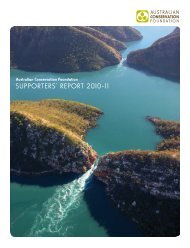Better than growth - Australian Conservation Foundation
Better than growth - Australian Conservation Foundation
Better than growth - Australian Conservation Foundation
Create successful ePaper yourself
Turn your PDF publications into a flip-book with our unique Google optimized e-Paper software.
etter business<br />
Compared with private corporations, which are often advised that<br />
their overriding legal obligation is to maximise shareholder profits, 55 these<br />
other types of business organisations can more easily adopt ethical and<br />
community-oriented business approaches.<br />
It is surely no accident that successful non-profit and governmentowned<br />
businesses in Australia – such as VicSuper, mecu, <strong>Australian</strong><br />
Unity and many public water utilities – have led the way in innovative<br />
products and research to foster a sustainable future economy. Australia<br />
should celebrate and encourage such cooperative and government business<br />
enterprises.<br />
Policy Directions<br />
• Encourage long-term, active share ownership.<br />
• Introduce minimum holding periods for the exercise of shareholder rights –in<br />
the US the Securities and Exchange Commission has proposed a one-year<br />
minimum<br />
• Set capital gains tax rates on a sliding scale to reward long-term ownership<br />
• Lead by example – funds managed on behalf of <strong>Australian</strong> governments should<br />
be leading the way on active share ownership, rather <strong>than</strong> trailing the pack<br />
• Ensure compensation systems encourage long-term performance.<br />
• Require fund managers seeking government business to adopt long-term,<br />
focused compensation systems across the board<br />
• Require the remuneration of CEOs of major companies to be genuinely linked<br />
to long-term financial, social and environmental outcomes<br />
• Introduce ‘claw-back’ provisions to recapture executive compensation to cover<br />
significant environmental or social liabilities<br />
• Require major companies to disclose environmental and social performance and<br />
risks.<br />
• Amend directors’ and trustees’ duties to clarify that the interests of companies<br />
extend to the full range of stakeholder relationships, not just shareholders.<br />
• Support cooperative and non-profit business models, including by preferences in<br />
government procurement.<br />
• All government-managed funds should become signatories to the United Nations<br />
Principles for Responsible Investment and consider environmental, social and<br />
governance practices in their investment portfolios.<br />
55. See, for example,<br />
www.allbusiness.com/<br />
management-companiesenterprises/516029-1.html.<br />
Compare this with<br />
German law, for example,<br />
which provides that “the<br />
content of the company’s<br />
interests is ‘the<br />
upholding and ongoing<br />
functional fulfilment<br />
of the company’s<br />
duties to investors,<br />
workers, suppliers,<br />
customers, consumers,<br />
state and society’.”<br />
See Christoph Kuhner,<br />
‘Unternehmensinteresse<br />
vs. Shareholder<br />
Value als Leitmaxime<br />
kapitalmarktorientierter<br />
Aktiengesellschaften‘<br />
(Company Interest<br />
vs. Shareholder Value<br />
as central principle<br />
of capital marketoriented<br />
corporations),<br />
Presentation to Instituts<br />
für Arbeits- und<br />
Wirtschaftsrecht der<br />
Universität zu Köln,<br />
(21 July 2003), www.<br />
econbiz.de/archiv/k/<br />
uk/swpruefung/<br />
unternehmensinteresse_<br />
shareholder_value.<br />
pdf. (Citations omitted;<br />
translation by ACF.)<br />
ACF BETTER THAN GROWTH 27
















